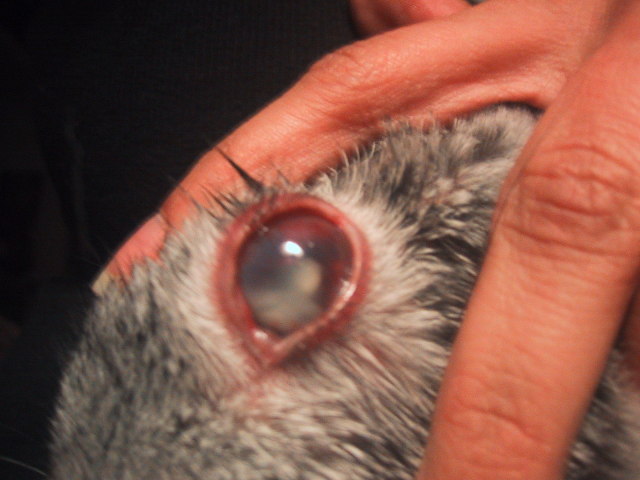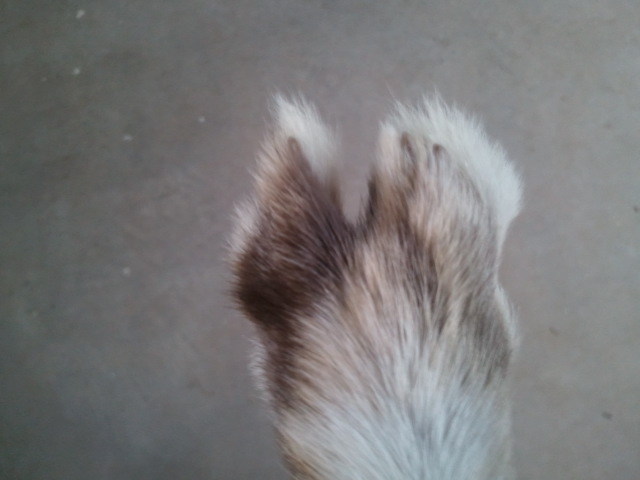QuestionQUESTION: We woke up last week to find our beloved house bunny (approximately 5 1/2 years old) struggling with his back legs and scooting around in his house. We took him into the vet later that day and she examined him. She checked his reflexes, which were still there and gave him a "feel" check and what I guess would be a percussive check with a mallet, but said she didn't think that he had any broken bones. It was thought that he had perhaps fallen overnight, as he has a multi level house that requires jumping between levels.
He has had a rough go of it over the last year or so. He had torticollis last summer, which was horrible, but thankfully responded amazingly well to Baytril and went away in only a few days, with only very minimal residual effects. A month or two later, he had another round of ileus, which he hadn't had in several years, but luckily the clog went through and he was fine again. Then, late in the fall, we started noticing that he was having some weakness in his legs, as he was losing his grip at times walking around...not bad, but enough for us to bring him in and have the vet think that he'd developed arthritis already. Since that time, he's been taking Metacam for pain and an all-natural glucosomine supplement for dogs. The Metacam seemed to help initially, but over time has not seemed to help quite as much. I'm not sure he has ever had enough glucosomine to make an impact, as we find it hard to give him. It's a powder, so we wet his nightly pellets and try to coat them like shake-n-bake, but a bunch of the powder ends up left behind. Nonetheless, he was having good days and not quite as good days, until this happened last week.
Anyway, back to more current events. Last week, the vet said to keep him from jumping and keep him in a confined area for a few days. The funny thing was, after she had examined him and manipulated him, etc., he stood up and hopped back into his carrier like nothing ever happened. We took him home and for the next 3 days, he seemed to get better every single day. The last day, he was doing absolutely awesome, doing things I haven't seem him do in at least 6 months, so we were really happy about it. Then, the next morning, we wake up and his legs are completely splayed out, like doing the splits and dragging his butt around like he was the first time. Needless to say, we were very disheartened and we put in a call and e-mail to our vet to tell her the status. We've done a bunch of reading online about the possibilties of a skeletal problem, muscular problem or other disease process, so we wanted to ask if it would be beneficial at this point to at least do some x-rays and a blood test. We really like our vet and she has a great way with animals, but she likes to keeps things easy and not stress him, nor needlessly medicate him, if it can be avoided. I can certainly appreciate that, realizing how fragile rabbits are, especially when it comes to their skeletons and digestive tracts. We even forwarded a copy of the bio/miami/edu article about hind leg paresis to her, just in case she hadn't thought about such things (including the possibility of chiropractic services, massage therapy and laser acupuncture, but that may be jumping ahead of ourselves, until we at least have a guess at what the problem might be). Anyway, we called and e-mailed on Tuesday, but didn't hear anything back. Called again this morning and supposedly someone is going to give us a call today to respond to our inquiry. Now that I have written a novel about the situation, the main question my wife and I have is: Should we consider trying another vet who might be, at least, a little more agressive?
I have appreciated the more easy-going, homeopathic approach, but it sure seems to us that we should at least try a few things like x-rays and blood tests. Also, I didn't mention above that he also has problems with sneezing, which he has had for at least the last 4 years. The vet originally told us that it could be pastuerella, but that there wasn't really anything that could be done about it, other than trying a round of Baytril, which didn't help. Other times, she's said it could just be allergies. In fact, after checking around on the net and clearing it with her, we've had him on Benadryl twice a day for a month or two and it does help. He's still pretty snarfy some of the time, but it keep the more violent sneezing fits down to a minimum. His nasal discharge has gone from clear to cloudly white over the years, but the vet has never recommended any testing or anything. All of this to say that we do know of, what is supposed to be a good rabbit vet, not very far away from us that we could go see to get a second take on what might be happening with our bun. Needless to say, we have been pretty down in the dumps about him since the relapse occurred 3 days ago. There has been a short time or two since then, where he has showed just a little strength, but not much at all.
Anyway, after that novel, what's your opinion on our situation? I think I know the answer, but my wife and I would certainly appreciate some incredibly intelligent advice at this point on both his condition and the subject of getting a second take on our little guy. Thanks so much, in advance.
ANSWER: Dear Paul,
Yes, I agree with you that it's time to find a vet who knows a little bit more about rabbits and the various causes of hind limb paresis. With your bunny's history of torticollis and hind limb weakness, a very strong suspicion of Encephalitozoon cuniculi would be second nature for a rabbit-experienced vet. It is very important that this be treated as promptly as possible for best chance of recovery of movement. At the moment, most vets are using fenbendazole or oxibendazole against this parasite (some vets use albendazole, but this is the most toxic of the three drugs, and we don't use it for that reason). A new drug, Ponazuril (Marquis, by Bayer) is also showing tremendous promise in treating this parasite, but it is very expensive.
The dose we use for any of these drugs is 20mg/kg daily for 28-30 days. Please read:
www.bio.miami.edu/hare/paresis.html
and find a more rabbit-savvy vet here:
www.rabbit.org/vets
The new drugs might not help, but they certainly will give your bunny a better chance than a "just wait and see what happens" attitude. I hope you can get him to a vet who will try the E. cuniculi treatments as soon as possible.
Hope this helps.
Dana
---------- FOLLOW-UP ----------
QUESTION: Thank you so much for your prompt and very informative response. You basically reaffirmed what we already knew to be true. We've now got an appointment for tomorrow morning with a vet in our area listed on www.rabbit.org.
Always scary to give our little guy a drug he's never had before (basically, all he's ever had is Baytril, Metacam and some gut motility drug from years ago), but assuming that it's the way the new vet wants to go, it's bound to be worth it, to possibly rid him of the parasite and give him a fighting chance. Hopefully, it would be a moderately safe drug with minimal side effects. All of this assumes they don't find something else, of course.
I am still amazed at how quickly he got over the torticollis last summer (2-3 days after starting on Baytril), so he's definitely a fighter. I'm sure I don't have to tell you how important their mental attitude is towards recovery and adaptation. At least now there might be some hope at regaining some of his mobility, be it through a drug or something else, under the advice of a more rabbit savvy vet. He may be 5 1/2, which some have tried to tell us is ancient for a rabbit, but luckily there are places and people like you to get more current info out there.
Thanks so much, again!
ANSWER: Dear Paul,
We have used fenbendazole and ponazuril on *many* rabbits with excellent results and no observable adverse side effects, ever. I am sure that if your vet decides to prescribe this for your bunny that he'll be safe.
And when I told our Maggie (born 2 February 1994) that some people are telling you that 5.5 is "ancient" for a rabbit, she just snorted Critical Care up her nose. ;)
Hope all goes well at the vet, and that your boy is on his way to recovery soon!
Dana
---------- FOLLOW-UP ----------
QUESTION: An update - our little man is doing pretty well. Eating and drinking just fine, and seems to have a really good attitude. He's already adapted to different ways of balancing to bathe, eat cecotropes, etc. He's still showing flourishes of having a little strength in his back legs and feet on occasion, which the vet says is a good sign, so at least it's not total paralysis at this point.
Anyway, we took him to a more rabbit-savvy vet and had x-rays, blood tests and a culture performed. X-rays revealed no fractures or anything significant other than the incidental finding of kidney stones...geez, like the poor little guy hasn't got enough problems! Standard blood test only revealed a bit of anemia, which they said would be consistent with him fighting an infection. The nasal culture came back as positive for some sort of bacteria and he's back on Baytril, although we have tried that before. The interesting thing this time is that the vet said he might need to stay on Baytril for 2-3 months this time. I don't think he's ever been on Baytril for more than a single session (1 month or slightly less), so perhaps being on it longer will give it more time to kill the bacteria.
Then, probably the most interesting finding just came back of a positive titre for e-cuniculi...as a high number was found, indicating exposure, which I guess would have occurred way back before we even found him 5 years ago. Anyway, the vet is prescribing Panacur, which I believe is febendazole, in paste form, once a day for 30 days. This brings me to several questions:
1) It is unusual to have a bunny on Baytril long term (2-3 months)?
2) I'm guessing it's safe to have a bunny on both Baytril and Panacur at the same time, else they wouldn't recommend it, but we've been conditioned by our original vet to keep him off medicine as much as possible, so we're just trying to wrap our minds around using a bunch of stuff at the same time (Baytril, Panacur, Metacam and Benadryl). Btw, our new vet wants to take him down to Metacam every other day, instead of every day, if possible, so we will try that. The Benadryl we were using originally to help with his sneezing and snarfiness, but it's also got the added benefit of being a transport for Baytril, as we were given the tablet form, which we find impossible to give properly consistently. I'm not sure how we'll handle the Panacur paste. Maybe we'll get lucky and it will taste good...or we can drop a few drops of Benadryl on it.
3) The incidental finding of kidney stones is a bit worrisome to us, as we only know about kidney stones in humans. We understand there's no real way of dealing with them other than surgery, which is probably not a very desirable option, as I guess they haven't developed a tiny ultrasound machine or something to break them up in small animals. We're hoping that they will just be dormant and not cause any major problems for a good while, but we were curious if there is anything diet wise that might continue to contribute to the kidney stones getting worse, or bigger or multiplying?
4) Since he's not got any bone fractures, do you think it would be wise to continue keeping him from moving around a whole lot or would it be better to let him have a little more free movement under our close scrutiny? Basically, he's moving around, we just are keeping him in a pretty limited area, smaller than normal, both when we are home and when we are gone. I'm just wondering if a little more excercise would be a good thing or not.
Once again, sorry for the long-windedness of these questions. We thank you so much for the wonderful advice and re-assurance you have given us! I'm sure it's pretty obvious how nuts we are for our bun, so please bear with the over-explaining nature of our questions, etc. Thanks again!
AnswerDear Paul,
Aw, you guys sound like the best bunny parents. :) He's very lucky to have you.
Well, to answer your questions one at a time:
1. It's not unusual to have a bunny on antibiotics long term, and not just Baytril.
2. We've used Panacur and Baytril together with no problems at all.
3. I think it's a good idea to use the metacam less, if possible. There are possible kidney issues...
4. Kidney stones! That is not good news. The bad news is that this is probably not due to diet, but to general metabolic bone disease, possibly affected to some extent by the presence of E. cuniculi, which can damage the kidneys (this is speculation, but many people believe that E. cuniculi may be doing damage to the renal and central nervous systems in ways we don't fully understand).
Some vets will recommend a low calcium diet, while others (and among these are some of the best in the field) say that this will do more harm than good, since the rabbit is already having trouble maintaining calcium in the bones. So I would just suggest *moderate* calcium intake, avoiding things like spinach. No one really knows if diet is a factor in kidney stones/calcification or bladders stones/sludge--so I'm not really sure I can advise you on this part.
5. I think it's fine for him to truck around if it makes him happy, and as long as he doesn't hurt himself by catching himself in a spot he can't get out of. His psychological wellbeing is important, and since he has no broken bones or arthritis evident, I can't imagine any reason to confine him. I think exercise can only be good for him.
I'm glad you've found a good vet who knows what to do, and I hope you're little guy will be on the road to recovery soon!
Take care,
Dana

 EXTREMELY concerning eye problem
QuestionTinkerbells Cloudy Ey
QUESTION: Dana,
M
EXTREMELY concerning eye problem
QuestionTinkerbells Cloudy Ey
QUESTION: Dana,
M
 TMJ Osteomyelitis (e. cuniculi) or just TMJ & options
QuestionEarless Glenna
QUESTION: Hi Dana,
My re
TMJ Osteomyelitis (e. cuniculi) or just TMJ & options
QuestionEarless Glenna
QUESTION: Hi Dana,
My re
 broken bunny toe
Question
broken bunny toe
My bunny got spooked and jump
broken bunny toe
Question
broken bunny toe
My bunny got spooked and jump
 Rabbit diet for baby and adult rabbits.
QuestionJabby
QUESTION: Hello,
What is the age
Rabbit diet for baby and adult rabbits.
QuestionJabby
QUESTION: Hello,
What is the age
 Tubing rabbits VS masking rabbits
Question
V-Gel Airway Device
Hi Dr Krempels,
My
Tubing rabbits VS masking rabbits
Question
V-Gel Airway Device
Hi Dr Krempels,
My